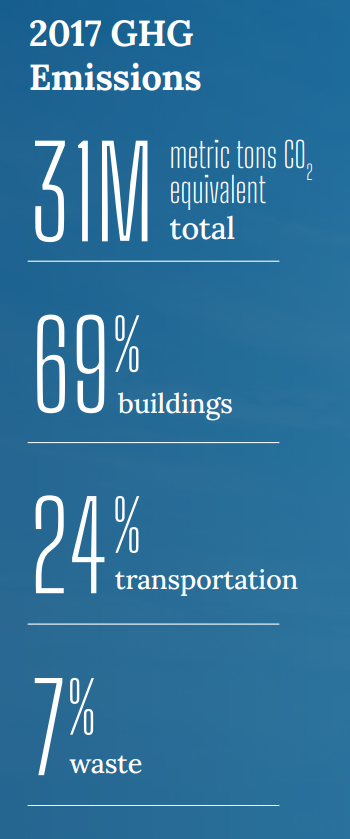Electrify Chicago
An independent tool for viewing City of Chicago building data
According to the
2022 Chicago Climate Action Plan,
69% of Chicago's emissions come from buildings, making
building emissions our biggest challenge and our biggest opportunity as a city
to tackle climate change. At Electrify Chicago, we showcase building performance using
publicly available data supplemented by community-submitted photographs and building
owners.
Start by looking at Chicago's buildings with the highest greenhouse gas intensity i.e. emissions per square foot. Large, efficient, buildings can perform much better than very inefficient small buildings on this metric.
New Article
📰 $30 Million In Missed Fines
The City Of Chicago failed to collect $30 million in potential fines from the building benchmarking ordinance, reducing transparency and accountability.
Legislative update! 🎉
As of late January 2024, legislation is being introduced to require new use more efficient forms of water and space heating, via the Clean And Affordable Buildings Ordinance (CABO), which will reduce the number of highly polluting and inefficient buildings that end up on this site.
If you're in Chicago,
write to your alderman to support the CABO!
Chicago Buildings by Greenhouse Gas Intensity
Note: Data includes large Chicago buildings with data from 2022, unless explicitly stated otherwise.
Note: This data only includes buildings whose emissions are reported
under the
Chicago Energy Benchmarking Ordinance. According to the City “As of 2016,
this list includes all commercial, institutional, and residential buildings larger than
50,000 square feet.” This dataset is also then filtered to only buildings with
reported emissions > 1,000 metric tons CO2 equivalent.
The latest year of data is from 2022, but we update the site regularly when new data is available, and some buildings may have failed to report that year, and only have older data available.
| Property Name / address | Primary Property Type |
Greenhouse Gas Intensity (kg CO2 eq./sqft) |
Total Greenhouse Emissions (metric tons CO2 eq.) |
|---|---|---|---|
|
THE WATERGATE EAST CONDOMINIUM
🕰️
5471 S HYDE PARK BLVD
| Multifamily Housing | 6.4 kg/sqft | 350 tons |
|
Franklin Building
720 S DEARBORN ST
| Multifamily Housing | 6.4 kg/sqft
Lowest 49%
| 516 tons
Lowest 28%
|
|
5740 N SHERIDAN RD
5740 N SHERIDAN RD
| Multifamily Housing | 6.4 kg/sqft
Lowest 49%
| 606 tons
Lowest 34%
|
|
2416 2458 W GREENLEAF AVE
2416 2458 W GREENLEAF AVE
| Multifamily Housing | 6.4 kg/sqft
Lowest 49%
| 508 tons
Lowest 27%
|
|
600 N Lake Shore Dr
600 N Lake Shore Dr
| Multifamily Housing | 6.4 kg/sqft
Lowest 49%
| 5,168 tons
Highest 7%
|
|
7340 7352 N RIDGE BLVD
7340 7352 N RIDGE BLVD
| Multifamily Housing | 6.4 kg/sqft
Lowest 49%
| 709 tons
Lowest 41%
|
|
500 W BELMONT AVE
500 W BELMONT AVE
| Multifamily Housing | 6.4 kg/sqft
Lowest 49%
| 352 tons
Lowest 13%
|
|
3127 3139 W PALMER ST
3127 3139 W PALMER ST
| Multifamily Housing | 6.4 kg/sqft
Lowest 49%
| 386 tons
Lowest 16%
|
|
6830 N SHERIDAN RD
6830 N SHERIDAN RD
| Multifamily Housing | 6.4 kg/sqft
Lowest 49%
| 409 tons
Lowest 18%
|
|
One North Franklin
1 N Franklin
| Office | 6.4 kg/sqft
Lowest 49%
| 4,564 tons
Highest 8%
|
|
10/30 South Wacker
🚩
10 S Wacker Dr
| Office | 6.4 kg/sqft
Lowest 49%
| 18,395 tons #18 Highest
|
|
2715 N CICERO AVE
2715 N CICERO AVE
| Senior Living Community | 6.4 kg/sqft
Lowest 49%
| 484 tons
Lowest 25%
|
|
211 E Chicago Ave
211 E Chicago Ave
| Office | 6.4 kg/sqft
Lowest 49%
| 2,524 tons
Highest 17%
|
|
920 W WILSON AVE
920 W WILSON AVE
| Multifamily Housing | 6.3 kg/sqft
Lowest 48%
| 784 tons
Lowest 45%
|
|
3436 N Osceola Avenue
3436 N Osceola Avenue
| K-12 School | 6.3 kg/sqft
Lowest 48%
| 420 tons
Lowest 19%
|
Data Source:
Chicago Energy Benchmarking Data
